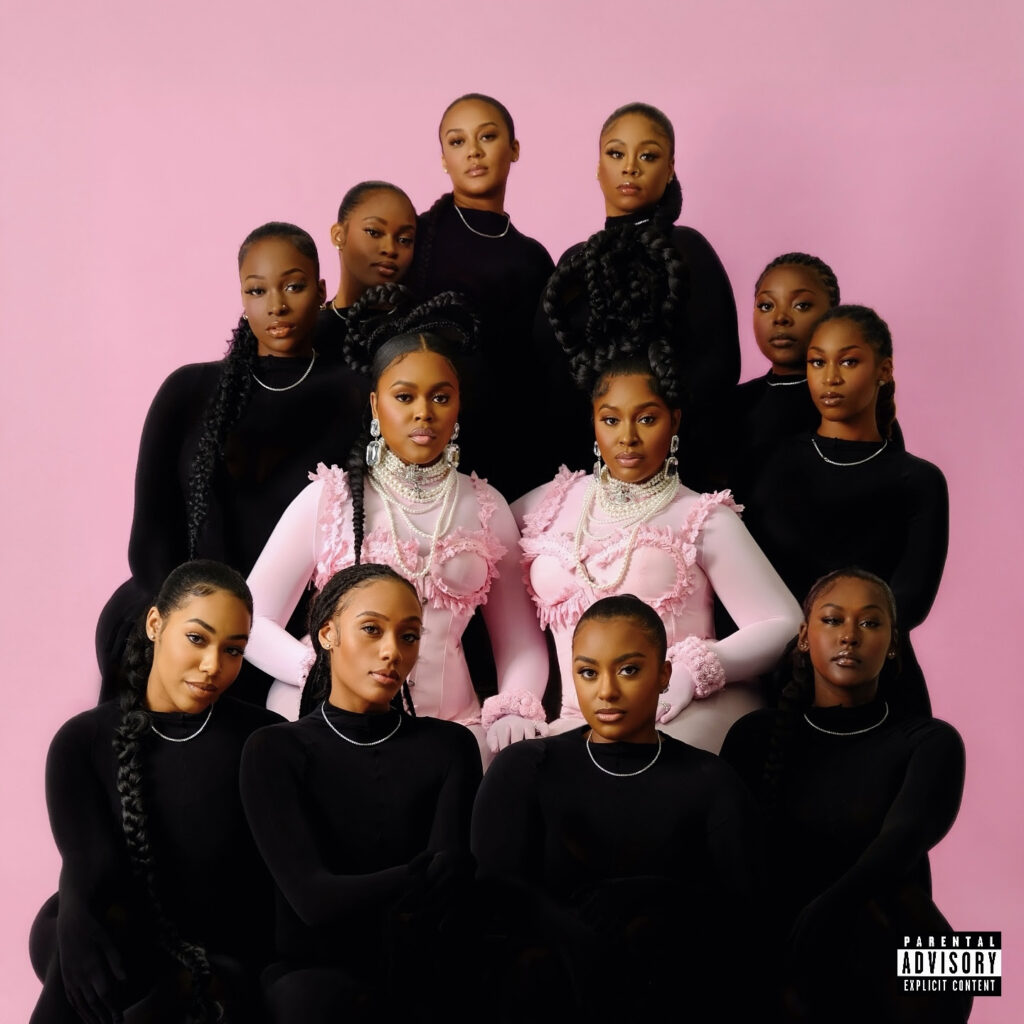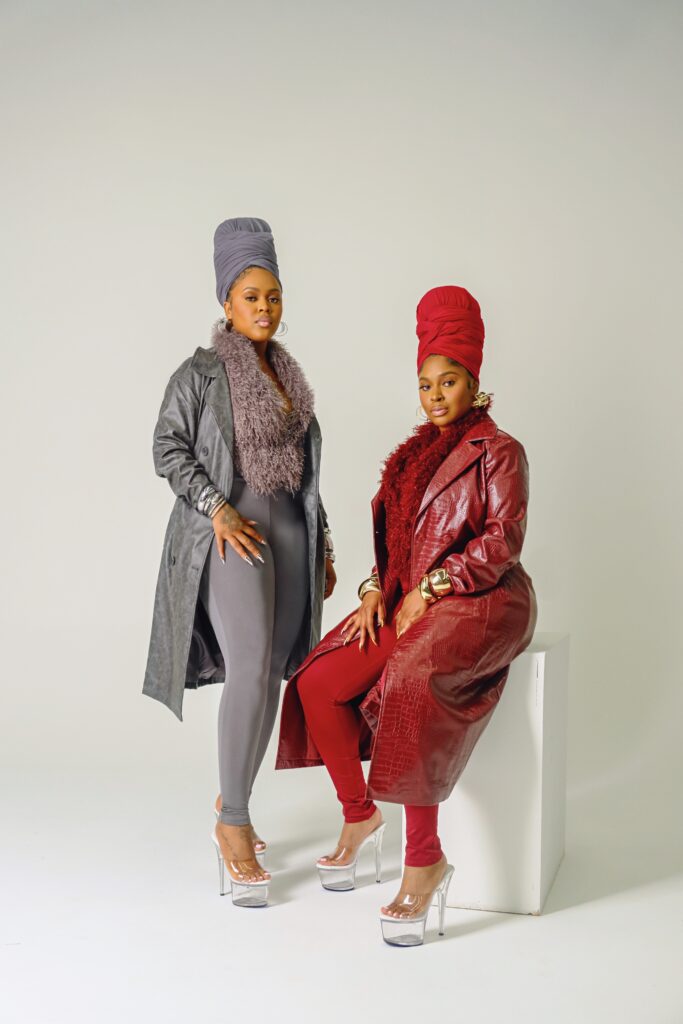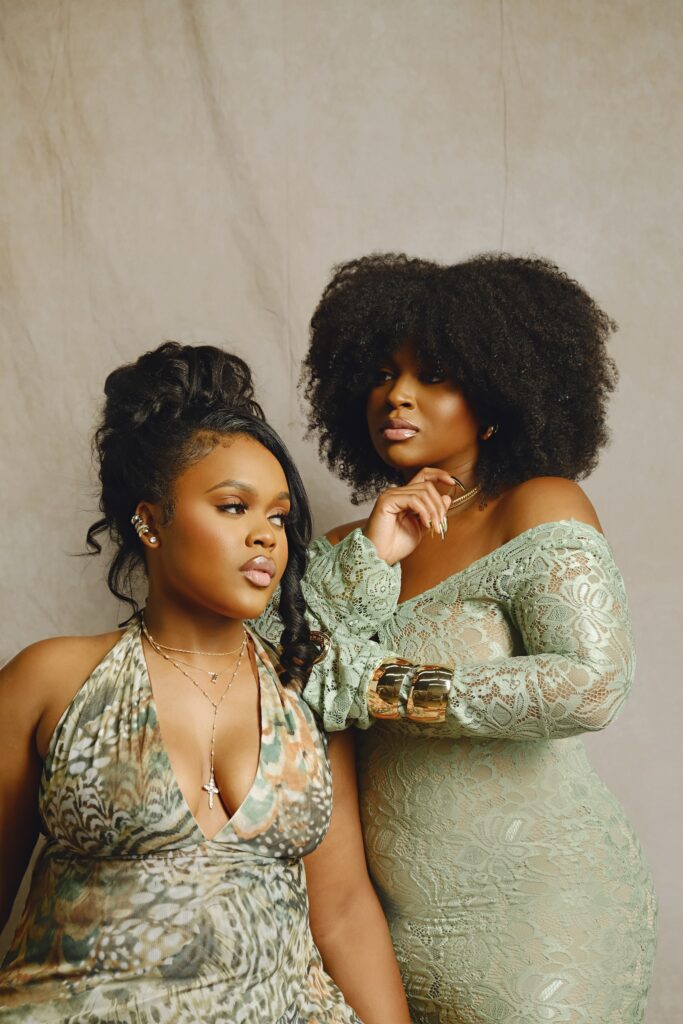For The Amours, sisterhood extends beyond blood. It’s why the duo, sisters Jakiya Ayanna and Shaina Aisha, are joined by 10 other women in the cover art for their debut album, Girls Will Be Girls.
“We have a sisterhood to death do us part, but because we are girls’ girls, we wanted that to be displayed,” Shaina tells Rated R&B over a video call. On the cover, the two are dressed in matching pink and white ensembles, surrounded by a group of friends and supporters in all-black attire, against a pink backdrop.
“We are girls’ girls in real life,” proclaims Shaina. “We were like, ‘Something that’s important for this is strength in numbers. Let’s call up some homegirls.’ The shoot was so much fun, and it embodied Girls Will Be Girls.”
In essence, Girl Will Be Girls is an invitation for women of all walks of life to unite through shared experiences. “So often, women are pitted against each other,” Shaina adds. “And it’s like, ‘No girl, we all are going through the same things. Whether you are talking about it publicly or privately, we share the same story.”

The Amours’ story begins in Washington, D.C., where they grew up singing in church. Their mom recognized their vocal talent and quickly enrolled them in programs to hone their skills.
“We were in street theater. We were in something called the DC Youth Ensemble. Then she put us in Arlington Youth Street Theater,” shares Jakiya. “Then we went on to doing this program called Hands on the Future. So she kept us in development programs of musical theater and things like that to expose us to it [and] to see if it’s something that was going to stick.” And it did.
The Amours officially formed in 2013, when they were teenagers auditioning for The X Factor. “Our oldest sister actually gave us that name,” reveals Shaina, “Because we had to submit a name for X-Factor, and we were like, ‘OK, we’re going to go with this.’” Although they didn’t pass the audition, they didn’t lose courage to keep going.
A few years later, they landed an ongoing gig as traveling background vocalists for PJ Morton. Our first gig with PJ, we’ll never forget, was at the El Club in Detroit,” recalls Jakiya. “We went from being in the clubs to doing theaters and it expanded.”
Around the same time, The Amours had signed a deal with Morton’s indie label Morton Records. With such a demanding touring schedule, there was limited time for them to focus on music. “Everything happened so fast that we were like, ‘When are we going to have the time to really invest in ourselves, do the project?’” says Jakiya. She notes that their first EP under Morton Records, Mon Amour, was recorded in a week. “It was fun and cool, but it was like, ‘We have to keep going,’” she adds about their 2019 project.
Yet, there were some challenges in keeping up their momentum while on the road as professional background vocalists. They had to make a decision. “We’ve always known that we weren’t background singers,” Jakiya says. “It’s not a dig to them, but we’ve seen so many people who aspire to be artists, and they get stuck in that space. We had to take that leap of faith and be like, ‘OK, cool. We did five tours in that space. At what point are we going to better ourselves?” That leap of faith took them on a much-needed hiatus.

In winter 2023, The Amours made their reintroduction with “Don’t Deserve” via Jaha Johnson’s November Yellow label. The boundary-setting track served as the lead single from their Changes EP, executive produced by Camper (Mary J. Blige, H.E.R., Coco Jones).
Changes reflected the transformation, trials and tribulations they faced in their personal lives and as an evolving duo. “Changes was real to us,” comments Shaina. “We were going through so many changes in our lives.”
Girls Will Be Girls, released Aug. 15 via November Yellow, still acknowledges life’s seasons but with a more assured edge. “That One Ex” asserts self-worth after being left for someone else, who later tries to come back. “Yeah, I’m that one ex / That one you wish you never left / That one ex that you’ll never forget,” they sing on track two.
The white-hot “Burnin, Burnin” feels like a romantic getaway with a special person, while “Prove” rekindles an old flame without the pressures of the past.
Things take a dramatic turn on “Bro,” where a platonic friendship turns intimate with the desire for more. “You supposed to be my bro / But after we did that shit, oh / We gon’ have to close that door / Ain’t no bro and sis nomore,” they sing.
The pleading ballad “Clarity” seeks answers to where a relationship stands instead of quietly navigating in the dark. They co-wrote the Camper-produced single with DIXSON (Beyoncé, Kehlani), who also contributed to four other tracks on the album, including the stripped-down closer “Home.”
Below, The Amours reflect on their decade-spanning musical journey that’s only getting started. They also discuss Girls Will Be Girls, including breaking down several tracks, the importance of women’s empowerment, and more.
After your Mon Amour EP in 2019, you stepped back from releasing music for a few years before returning in 2023 with new material. What was happening for you during that time?
SHAINA: We actually recorded two other EPs that never came out. During the pandemic, we decided to still work — we were safe — but we were trying to stay productive. We were like, “This doesn’t feel like what we want to put out. Let’s not rush, but be intentional about what this next sound would be.”
You posted on Instagram that this album process has been your best yet. What made this one so enjoyable and how did it give you creative clarity?
SHAINA: Part of it was taking that break to just really know what we want and what we want to do. Changes was so real to us. We went through that. Our grandfather passed in the midst of us rolling out the album. We were going through so many changes in our lives. With this process, we were even more confident because we had already came out with more music, and we are out again. Now we’re more open to showing what we’re going through and who we are.
JAKIYA: The clarity for us within this process was thinking about how and where we started. On Mon Amour, people heard us singing everything in unison. We went from that to Changes and splitting things up. We were still trying to find our voice within Changes. Now we’re here with Girls Will Be Girls. We’re much more confident in our voices. The picture is super clear. We know who we are, and we’re ready to showcase that.
Let’s dive into a few tracks from the album, starting with the latest single “Clarity.” It’s such a strong ballad, lyrically and vocally, that deserves as many ears as possible. What went into making that song?
JAKIYA: “Clarity” came about on the latter end. So, we’ve dated different people and stuff like that. The common thing, especially, I’ll say for me, is we like to get to the point. Don’t toy with me. Be clear. Say what you mean and stand on it. The first day DIXSON came [to the studio], we were sitting with him talking. He was like, “If you were trying to get your man to say something to you, what would you say?” We said, “Are you good? Are we good? Why do we have to beat around the bush? Let’s just have the conversation.”
Just because we’re not seeing eye to eye doesn’t mean we’re not meant to work. Sometimes we just need to talk about it. I think a lot of people in our generation now lack that. They don’t want to have conversations, they don’t want to face their problems and don’t want to take accountability. When you don’t want to do those things, nothing’s going to grow.
“Bro,” a standout, crossing that line with a friend. How did that song come together?
SHAINA: We’ve been holding onto “Bro” since 2021. It had a sample on it at first, Angie Stone’s “Brotha,” which we flipped the concept of that song. Then we had to go through the whole sample thing. We were like, “OK, this is an expensive sample, let’s wait.” So Camper reproduced it, and we were like, “This feels even better without the sample.” It’s one of our most special songs to us.
JAKIYA: [Angie’s] was more empowering and uplifting. Rest in peace to Angie. We were like, “Let’s figure out how we could flip the narrative on that record.” It’s something people go through. We keep saying we’re not confirming or denying anything on our record (laughs). “Bro” is one of those records that every time we play it for a homegirl or a homeboy, they’re like, “This is relatable.”
“Prove” is a simple yet essential vocal record. It feels like an extended interlude in the best way possible. What was your experience creating that one?
JAKIYA: “Prove” was so much fun. Once DIXSON came in at the latter end of the project, we were like, “We’ve written seven or eight songs now. Do you have any songs in your Rolodex that you think we would like?” We were looking for like an uptempo, midtempo interlude. So he’s playing a bunch of records, and starts playing something. We were like, “Hold on, run that one back.” We sent it to the engineer immediately, like let’s hear this loud. And we were like, “We really are those bitches. We don’t have anything to prove.” When we kept hearing it and went to cut it, we were like, “This is fly. This is something for the fly girls, the girls who are sure in themselves. We’re sure of ourselves. We’re strong Black women.” This is something we feel like other women would be able to relate to.
SHAINA: What’s funny is that it started as an interlude. It was a fun record for us. We do a lot of ballads. So we were like, “OK, let’s have fun a little bit.”
“Burnin, Burnin” is the smooth, dance-inducing bop of the album. What did you want to achieve?
JAKIYA: A lot of people don’t know, but our great-grandmother and grandmother, and all her siblings, are from Trinidad. Our grandfather’s Bohemian. We got West Indian roots in us, and we’ve always wanted to do that kind of song. We were all in the studio. Me and Shaina don’t drink when we sing, but that night we knew we needed liquor to pull off the island vibe and get into that pocket.
SHAINA: We had so much fun, and it feels so good. That was such a new record for us and we feel like if we try new things, we still have to Amours-it out. We still have to make it us.

You conclude Girls Will Be Girls with “Home.” What does that record signify to you?
SHAINA: That record made so much sense since we heard it. That’s another one that we were going through DIXSON’s folder of Camper records that they did together. We were like, “This one feels perfect.” We were excited to hear our voices on that record. We took our time singing that song. It really resonated with us. I think that was a great record. Even the track itself, Camper and DIXSON snapped on that record. It feels spiritual.
JAKIYA: “Home” is one of those records where we’ve always been like, “We need to make an album of songs that we feel like should be in movies.” When he played “Home,” we were like, “This is it.” It has that singer-songwriter vibe to it, but we wanted to do our Amours thing and put the R&B harmonies and soul into it. We felt like people needed to hear our voices on a record like this, for sure, and not box us in.
Of course, we want to be R&B superstars because we feel like you don’t always have to go pop. Pop means popular, so we can be popular with R&B. We loved how back in the day, Whitney Houston, Luther Vandross, Aretha Franklin, all of our people were huge R&B and soul artists. We don’t have to change who we are to do that. When we heard “Home,” we were like, “This is a popular record, but it’s R&B.”
What’s your biggest takeaway from working on Girls Will Be Girls?
SHAINA: I’m proud of how we stood for what we wanted in those sessions. We are always very vocal, but this time, there were more people in the room, so when people were saying their opinions, it was like, “Oh, do this kind of record.” We were just like, “Nope, that’s not true to us.” We were clear on that.
JAKIYA: I’m also proud of us standing on how we wanted it to be presented. The Amours are two Black women from D.C. who have plenty of ideas, but also want to showcase other Black women from D.C. or anywhere. We want people to see our visuals and hear our records, and be able to see themselves in it. We made sure that was a big part of our rollout, like the Black beauty with braids and things like that. We stood on everything to make sure we could produce the type of things that we want to see.
What do you want listeners to take away from Girls Will Be Girls?
JAKIYA: We want girls to be able to see themselves in and to know you have a sisterhood in The Amours. We want people to be like, “Oh my gosh, she went through that too.” We want everybody to feel included. Right now, we’re going through so many things in the world, when it comes to being inclusive, and we want women to be able to band together. We want people to start to have a conversation about things. We want people to get back in love again and plead a little bit. In a world where everything always has to be toxic, we want people to know that you can still be a lover.
SHAINA: Girls Will Be Girls represents that we can be all of those girls. I think each story will resonate at some point in your life. We want everyone to know it’s OK to be that — to be those girls!
Stream The Amours’ albumGirls Will Be Girlsbelow.